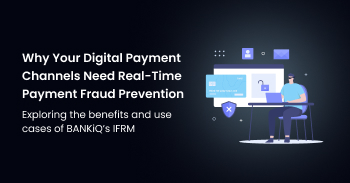By Minosh SALAM,
Director of Business Strategy at BANKiQ
The imperative of AML compliance in middle east

Anti-Money Laundering (AML) compliance refers to the set of regulations, policies, and procedures that financial institutions and other regulated entities implement to detect and prevent activities related to money laundering and terrorism financing. Money laundering is the practice of hiding the source of unlawfully acquired funds, often through transactions conducted with foreign banks or legitimate enterprises.
Now let’s look at the Middle Eastern Region. This region is home to several global financial centers, especially the GCC countries. These centers attract international business and investment, making them potential targets for money laundering activities. The region plays a significant role in international trade, and the movement of funds associated with trade activities requires vigilant AML measures to prevent illicit financial flows.
Some countries in the Middle East face higher risks of terrorism financing due to geopolitical factors. AML regulations help in preventing the flow of funds to support terrorism. The Middle East engages in a substantial volume of cross-border transactions. AML compliance is crucial to track and monitor funds flowing in and out of the region to prevent misuse.
However, the regulatory authorities in the Middle East are placing a growing emphasis on AML compliance. Financial institutions and businesses are required to adhere to international AML standards and best practices. Many Middle Eastern countries are part of global initiatives to combat money laundering, such as the Financial Action Task Force (FATF). Compliance with international standards is essential for maintaining positive global economic relationships.
Various Middle Eastern countries have enacted or updated AML laws and regulations to align with international standards. These frameworks place obligations on financial institutions to implement robust AML measures.
The BFSI sector is undergoing a significant digital transformation, with a growing reliance on fintech and digital financial services. AML regulations are adapting to address the challenges and risks associated with these advancements. AML compliance contributes to maintaining the reputation of financial institutions and businesses in the region. Investor confidence is bolstered when there is assurance that the financial system is secure and not prone to illicit financial activities.
Governments in the Middle East are committed to addressing financial crime, including money laundering. They are working on enhancing regulatory frameworks and collaborating with international organizations to strengthen AML efforts. In summary, AML compliance is highly relevant in the Middle East due to the region’s status as a global financial center, its involvement in international trade, the risks of terrorism financing, the increasing regulatory focus, and the ongoing digital transformation. Compliance with AML regulations is essential for the stability and integrity of the financial systems in the Middle Eastern countries.
The Middle East has been actively combating money laundering through the implementation of robust regulatory frameworks, enhanced enforcement measures, and international collaboration.
Here are some key initiatives and strategies employed by countries in the Middle East to combat money laundering:
Anti-Money Laundering (AML) Laws and Regulations:
Many Middle Eastern countries have enacted or updated AML laws and regulations to align with international standards. These laws define money laundering offenses, establish reporting obligations for financial institutions, and outline penalties for non-compliance.
Financial Intelligence Units (FIUs):
Countries in the region have established Financial Intelligence Units (FIUs) to collect, analyze, and disseminate financial intelligence related to money laundering and terrorism financing. FIUs play a crucial role in facilitating information exchange among domestic and international agencies.
Regulatory Oversight:
Regulatory authorities in the Middle East, such as central banks and financial regulatory bodies, exercise vigilant oversight over financial institutions. They conduct regular inspections to ensure compliance with AML regulations and assess the effectiveness of internal controls.
Know Your Customer (KYC) and Customer Due Diligence (CDD):
A strong emphasis is placed on KYC and CDD procedures to verify the identities of customers and assess the risks associated with their transactions. Financial institutions are required to maintain accurate customer records and monitor transactions for suspicious activities.
Suspicious Transaction Reporting:
Financial institutions are mandated to report suspicious transactions to the relevant authorities. Timely reporting helps law enforcement agencies investigate potential money laundering activities.
Training and Capacity Building:
Training programs and capacity-building initiatives are conducted to enhance the skills of professionals working in the financial sector. This includes educating individuals about the latest AML trends, techniques, and regulatory updates.
International Cooperation:
Middle Eastern countries actively participate in international efforts to combat money laundering. Many are members of the Financial Action Task Force (FATF) or regional organizations that promote collaboration in the fight against financial crimes.
AML Technology and Innovation:
The adoption of advanced technologies, such as artificial intelligence, machine learning, and data analytics, is increasing in the region. These technologies aid in the detection of suspicious activities and enhance the efficiency of AML processes.
Freezing Assets and Sanctions:
Countries in the Middle East actively freeze the assets of individuals and entities involved in money laundering or terrorism financing. Sanctions are imposed to deter illicit financial activities and disrupt the financial networks of criminal organizations.
Public Awareness Campaigns:
Governments and regulatory bodies conduct public awareness campaigns to educate the public and businesses about the risks of money laundering and the importance of reporting suspicious activities.
Strategic National Risk Assessments (SNRAs):
Some countries conduct SNRAs to identify and assess the key money laundering risks within their jurisdictions. These assessments help prioritize resources and focus on high-risk areas.
The combination of legal frameworks, regulatory oversight, technological advancements, and international collaboration reflects the comprehensive approach taken by Middle Eastern countries to combat money laundering and maintain the integrity of their financial systems. Ongoing efforts are essential to adapt to evolving threats and ensure the effectiveness of AML measures.





